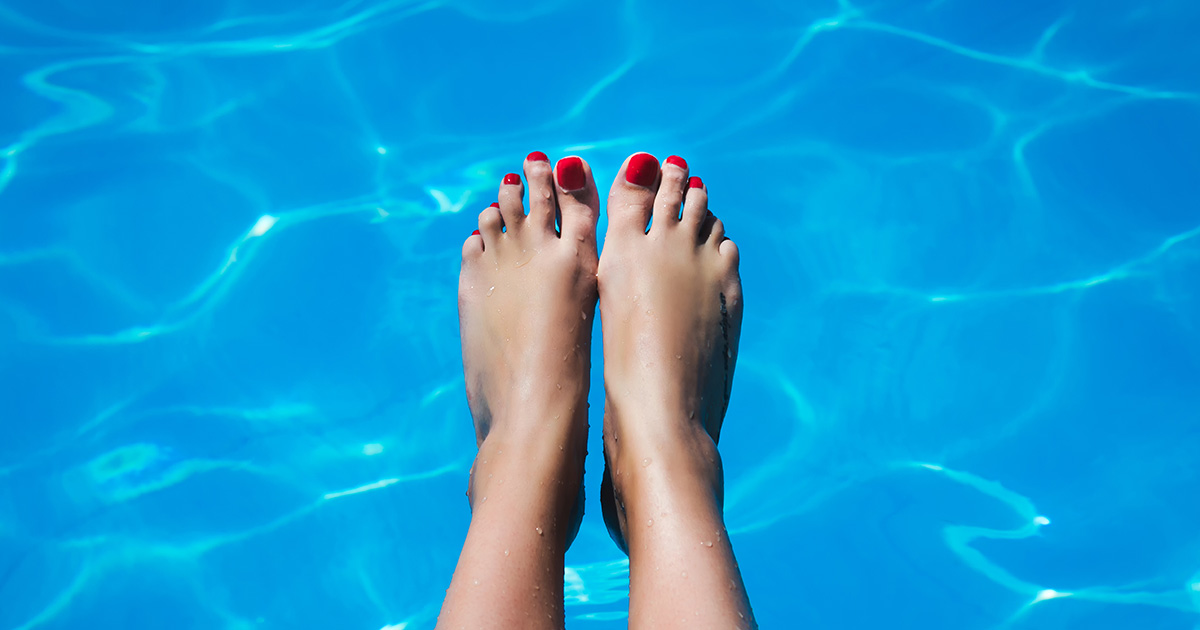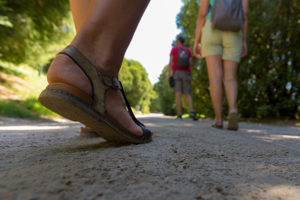
Your feet deserve some love this summer
Looking for a podiatrist?
Summertime means sandals, flip-flops and going barefoot while playing in the yard with the kids.
“With summer and the warm weather, people want to throw inexpensive flip-flops on and things like that. That can be very dangerous to your feet,” warned Marc Leonard, DPM, an OSF HealthCare podiatrist.
But a foray with flip-flops doesn’t mean you are destined for foot injuries.
Spend a little more for support
Dr. Leonard said avoid cheaply made flip flops and sandals. Spending the extra money could be a good investment for your overall foot health.
“I think sandals and flip flops are fine for some people. If you have no foot problems, you’re not diabetic, you have good sensation, probably a well-made supportive sandal with arch support would be just fine,” Dr. Leonard said. “However if you do have those problems, and you are diabetic or you are neuropathic, then those things have to be cautiously worn.”
Have foot pain?
Sometimes, however, even the best pair of shoes can’t mask issues that need attention. If foot pain persists, you should seek the help of a specialist.
“Pain is not normal. So if there is pain, if there’s discomfort, if there’s changes in your feet, collapsing to the feet, those are good times to see a podiatrist,” he said.
Find the right fit
Dr. Leonard said there is no perfect pair of shoes. He encourages people to spend time shopping to make sure they have the right fit for the summer footwear.
“Be cautious. Try them on in the store, get a good, supportive, well-made shoe, and I think that’s the best way to go about it,” he advised.
Summer foot care tips
 The American Podiatric Medical Association (APMA) provides the following summer foot care tips:
The American Podiatric Medical Association (APMA) provides the following summer foot care tips:
- Limit walking barefoot as it exposes feet to sunburn, as well as plantar warts, athlete’s foot, ringworm and other infections. It also increases risk of injury to your feet.
- Wear shoes or flip-flops around the pool, to the beach, in a locker room and even on the carpeting or in the bathroom of a hotel room to prevent injuries and limit the likelihood of contracting any bacterial infections.
- Apply and re-apply sunscreen all over your feet, especially the tops and fronts of ankles.
- Stay hydrated by drinking plenty of water to minimize any foot swelling caused by the heat.
- Practice periodic ankle flexes, toe wiggles and calf stretches to keep the blood flowing.
Think ahead
When packing for a trip or even just a day away with the family, be sure to pack an extra pair of sneakers or protective water shoes.
If your shoes get wet, make sure to dry them out completely before the next wearing to prevent bacteria or fungus from growing, according to the APMA.
The APMA advises being prepared with the following on-the-go foot gear:
- Sterile bandages — for covering minor cuts and scrapes
- Antibiotic cream — to treat any skin injury
- Emollient-enriched cream — to hydrate feet
- Blister pads or moleskin — to protect against blisters
- Motrin or Advil (anti-inflammatory) — to ease tired, swollen feet
- Toenail clippers — to keep toenails trimmed
- Emery board — to smooth rough edges or broken nails
- Pumice stone or cream — to soften callused skin
- Sunscreen — to protect against the scorching sun
- Aloe vera — to relieve sunburns
Seek care safely with OSF
If you suffer an injury to your feet or you’re experiencing sore feet, don’t put off seeking care. When you come to OSF for care, you can rest assured we are doing everything we can to keep you safe and healthy.
We follow guidelines from state and federal public health agencies to ensure we are doing everything we can to safely provide care in all of our facilities. This is especially true during times of increased community risk, such as the COVID-19 pandemic.
Find an urgent care option or a podiatrist near you.